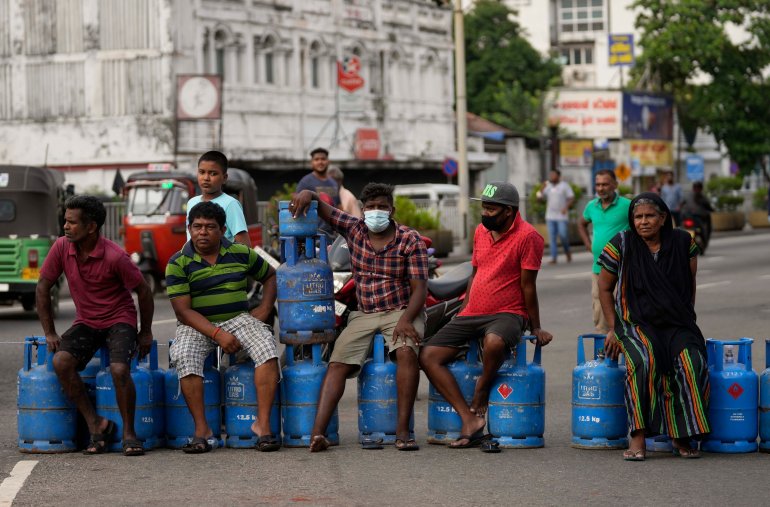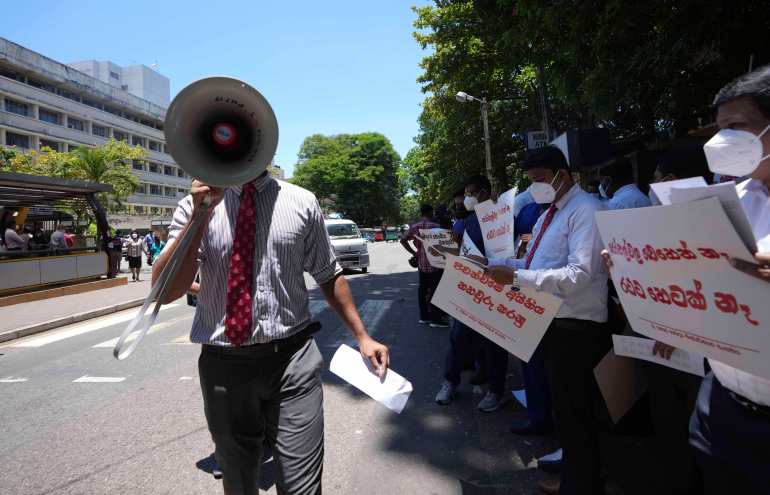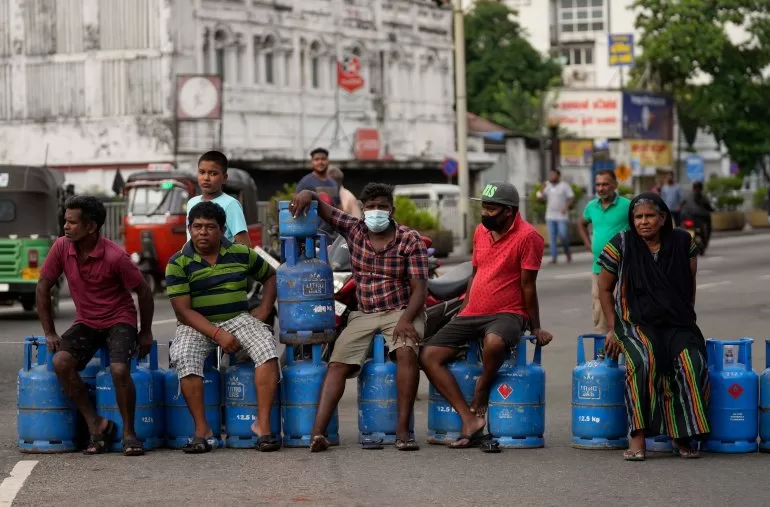The 35-year-old Sri Lankan doctor left Sri Lanka in January 2023 to take up a job in the United Kingdom, after working in a government hospital in the remote town of Hatton, 120km (75 miles) east of the capital Colombo, for six years. He is now a senior house officer for Britain’s National Health Service (NHS).
It wasn’t an easy decision. “I really love my country. That will never change,” Gamage told Al Jazeera. “But no matter how much money I earned, I had to pay back huge loans.” And with prices soaring as the economy collapsed – inflation touched a record 73 percent in late 2022 – Gamage felt he had no choice but to leave.
He is not alone. According to the Government Medical Officers Association (GMOA), the biggest trade union of government doctors in Sri Lanka, more than 1,700 doctors have left the country over the last two years, primarily for economic reasons. They constitute nearly 10 percent of doctors on the island.
The effects on the country’s already fragile healthcare system are visible. In April last year, all emergency surgeries were suspended for several weeks in the District General Hospital in Embilipitiya, about 200km (120 miles) south of Colombo, after two anaesthesiologists there left the country. As a temporary measure, another anaesthesiologist from a nearby hospital was moved there, but she has since also left for overseas training.
The paediatric ward at the Anuradhapura Teaching Hospital, about 200km (120 miles) northeast of Colombo, has also been forced to temporarily close down after all three paediatricians working at the hospital migrated. The GMOA has warned Health Minister Ramesh Pathirana that nearly 100 rural hospitals are on the verge of closing down as a result of doctors leaving the country.
All of this could have been averted, say doctors.

Missing: money and respect
Gamage’s basic salary was 64,000 Sri Lankan rupees ($213). With overtime payment added, it came to about 220,000 rupees ($730).
“I had to maintain my car, pay for food and rented accommodation, pay the loans and look after my parents,” he recalled. “After all of this, I was only left with 20,000 rupees [$67], so if you go to a party, that’s it. All done.”
But a sense of disrespect from government authorities added to his frustration.
While working as a junior doctor in a remote village, Gamage organised health camps after the shifts. Along with another doctor, he created a contact tracing app during the COVID-19 pandemic. But instead of appreciating their efforts, he says, the government of then-President Gotabaya Rajapaksa offered a contract to a private company.
“We did a presentation to the COVID-19 Presidential Task Force. They carefully listened and made notes about our app. Sometime later, we suddenly heard that our app – with some faults – has been produced by a private company.”
Eranda Ranasinghe Arachchi, a cardiologist at a national hospital in Colombo, listed three factors that shaped his decision to leave the country. He now works in Northern Ireland.
“Number one factor is basically, obviously, for financial reasons. Number two is better working conditions. Number three is building a better future,” the 35-year-old told Al Jazeera.
He said he felt a lack of respect from society at large, especially after the struggles of the pandemic.
“During the COVID-19 pandemic, we were so stretched but did our best to save as many lives as possible,” Ranasinghe Arachchi said. “There were times that, like many other doctors, I didn’t go home for several days due to the heavy workload and the fear of spreading the infection to my elderly parents at home.”
Sri Lanka’s economy slipped into an unprecedented crisis soon after the pandemic, with people forced to wait in queues for hours for food, medicine, fuel and many other essential items. Doctors were no exception.
But when the GMOA made a request for a special fuel quota for doctors, public opposition erupted. “Several days, I myself stayed in the queues for hours but obviously we could’ve spent that time treating a patient – but many people were in no mood to listen,” Ranasinghe Arachchi told Al Jazeera.

A better future
The spiralling inflation, unpayable foreign debt and shortages of fuel, medicine and food sparked nationwide protests that culminated in the removal of Rajapaksa from office in July 2022. Gotabaya and his brothers, Mahinda Rajapaksa and Basil Rajapaksa, were all found guilty of the financial mismanagement that hobbled the nation’s economy by the country’s Supreme Court in November 2023.
But Ranasinghe Arachchi, the eldest of three siblings with retired parents to look after, could not afford to wait until then.
He left Sri Lanka in August 2022.
“While I was a middle-grade doctor in Sri Lanka, I earned about 400 pounds [$508] a month. A similar kind of a doctor would earn at least 3,000 pounds [$3,800] a month in a country like the UK,” he said. And because of the breakneck inflation in Sri Lanka at the time, expenses in his home country and the UK were almost the same, he said.
Meanwhile, Gamage has managed to settle some of his debts over the past few months.
“Within one year, I have paid back a 1.5 million rupee [$4,630] loan, but if I was in Sri Lanka, I couldn’t have imagined that,” he said.
As patients and hospitals face the consequences, the GMOA – the doctors’ trade union – has submitted a series of recommendations to the government to try and stanch the bleeding of medical professionals.
“What they [doctors] believe is their salary is highly inadequate and the service they render to the country is highly undervalued. This is the major issue that we have identified,” Hansamal Weerasooriya, executive committee member of the GMOA, told Al Jazeera.
The absence of a proper career development system and the lack of any incentives for doctors working in remote parts of the country also contributes to their disenchantment, Weerasooriya said.
More deep-seated social prejudices also affect some doctors. “In Sri Lanka, with ego-driven, hierarchy-driven system, some doctors wouldn’t even sit together or eat together with nurses,” said Gamage. “But here in the UK, they never judge anybody. So this judgmental mindset really hurts your feelings.”
“I was fed up with the system.”
Still, if things improve enough – inflation is down dramatically – some doctors would be willing to return to Sri Lanka.
“I have been to many countries during a small period of time. And I find there’s no other country like Sri Lanka,” said Ranasinghe Arachchi. “If the country’s condition becomes better, and if our work is well recognised and if we are paid well enough, I’m really pretty much happy to come back.”
Yet, Ranasinghe Arachchi does not see all of that happening anytime soon. For now, Northern Ireland is where home will have to be.
